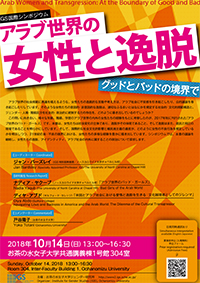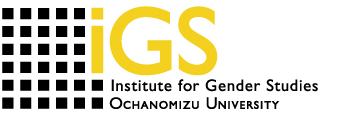 International Symposium “Arab Women and Transgression: At the Boundary of Good and Bad”
International Symposium “Arab Women and Transgression: At the Boundary of Good and Bad”
Date: Sunday, 14 October 2018 13:00-16:30
Venue: Room 304, Inter-Faculty Building 1, Ochanomizu University
Coordinator: Jan Bardsley (Specially Appointed Professor, IGS/Professor, University of North Carolina at Chapel Hill)
Women’s transgressive behaviors and perspectives are challenging societal norms in the Arab world, giving rise to anxiety and public debate. How do both intentional and unintentional transgressions illuminate the social and cultural constructs that define proper and improper behavior? How do they expose the social and political policing of gender, racial, and class divisions?
The new book Bad Girls of the Arab World engages these questions by examining the experiences of women from a range of ages, classes, and educational backgrounds who live in the Arab world and beyond. The book demonstrates that women’s transgression is both an agent and a symptom of change, a site of both resistance and repression. Showing how transnational forces as well as the legacy of colonialism shape women’s badness, Bad Girls of the Arab World offers a rich portrait of women’s varied experiences at the boundaries of propriety in the twenty-first century. At their presentations to the IGS Symposium Bad Girls of the Arab World co-editor Nadia Yaqub and contributor Diya Abdo continue this discussion, exploring the politics of women’s transgression, identity, and belonging in the Arab world and beyond.
| Program | |
| Introductory Remarks | |
|
Jan Bardsley (Specially Appointed Professor, IGS/Professor, The University of North Carolina at Chapel Hill) |
|
| Research Report | |
|
Nadia Yaqub (Professor, The University of North Carolina at Chapel Hill) |
|
|
Diya Abdo (Associate Professor, Guilford College) |
|
| Commentary | |
|
Yoko Totani (Professor, Ochanomizu University) |
Simultaneous interpretation available (English-Japanese)
Prior registration required Registration Form
Admission Free
Post-symposium get-together: 16:30-17:30
Research Report Abstract
“Bad Girls of the Arab World” (Nadia Yaqub)
My talk will focus on concepts that structure the book Bad Girls of the Arab World that I edited with the late Dr. Rula Quawas, and the various approaches that our contributors have taken to those concepts. I will explain why we chose to focus on transgression, how transgression differs from resistance, and what insights can be achieved through a multi-disciplinary approach to transgression. I conclude by considering the implications of transgression: How does transgression alter the intimate social connections created and sustained by women’s traditional work? How do women’s care for the home, nurturing of people, and collective food rituals offer creative modes for resistance? While such work is fundamental to social relations and cultural transmission, it is always also fraught, encompassing coercion and constraint as well as love and connection. It is also a site of continued, if at times almost invisible, transgression.
“Navigating Love and Badness in America and the Arab World: The Dilemma of the Cultural Transgressor” (Diya Abdo)
In this creative nonfiction/memoir piece, I detail my experiences in the U.S. and in Jordan as a western-trained academic who found it difficult to feel at home in either a post 9/11 America or conservative Jordanian institutions. These two different contexts’ various and competing expectations of Arab and Muslim women scholars and activists meant that I had to walk a constant tightrope lest I be considered anti-Arab and anti-Muslim in Jordan or anti-woman in the U.S. Even as I attempted to strategically navigate my feminism with my nationalism, my womanhood with my Arabness, my feminist longings with my postcolonial condition, it was impossible to be deemed “good” in either location. This led to painful exile and erasure. Through my experiences with my students, my children and the refugees I support through my program Every Campus A Refuge, I have found ways to make a home between cultures and to engage in these struggles in productive and meaningful ways.
Organizer: Institute for Gender Studies (IGS), Ochanomizu University

